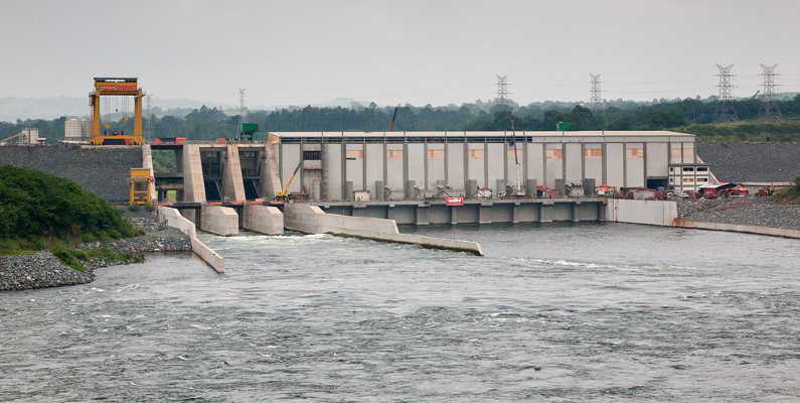Business
We warned you on Bujagali – Environmentalists tell Museveni
Uganda. Pictured in June 2011 by NAPE
For nearly a decade President Museveni has castigated Ugandan environmentalists and energy analysts for allegedly delaying the construction of Bujagali Hydro Power dam which he claimed resulted into rampant load-shedding, and the subsequent economic adverse economic ramifications a couple years ago.
But the President’s recent remarks in which he regretted the high cost of power sold to Ugandans by Bujagali Energy Limited (BEL) the consortium that financed the dam, abortion appear to vindicate the environmentalists who insisted the project was too costly and would translate into an unnecessarily heavy burden to Ugandan consumers.
While delivering his State of the Nation Address last Thursday at Serena conference centre in Kampala, President Museveni regretted the agreement his government made with Bujagali Energy Limited, saying the company is overcharging Ugandans by selling a kilowatt hour at US$11 cents (Approx. Ushs341).
President Museveni blamed environmentalists for the departure of AES Nile Power the company that initially wanted to build the dam. Museveni said AES had wanted to sell power at US$3 cents. When it vacated, the BEL consortium, which includes the Aga Khan Fund for Economic Development, and Sithe Global, from the US, negotiated a deal with Ugandan officials in which they agreed to buy power from the facility at US$ 11 cents.
And perhaps for the first time, the President has confirmed that his government is in talks with BEL aimed at paying it off so as to bring down the cost of power.
Museveni said: “We are going to engage the developer to see how we can refinance the project,”
Environmentalists have however decided they won’t take the president’s sticks lying down and have reminded Ugandans that the President’s unwillingness to take advice, and his corrupt officers are to blame for the high cost of Bujagali.
After nearly eighteen years of controversy that delayed the dam’s construction, the 250 Megawatt Bujagali dam was finally commissioned in August 2012 at a total cost of US$ 902 million.
Dickens Kamugisha, the Executive Director of the Africa Institute for Energy Governance (AFIEGO) said: “The President is lucky that he is ruling a country of very passive citizens who accept to be taken for granted. If Ugandans were serious people, they would have dismissed Mr. Museveni’s regrets with contempt because it is an abuse of our intellect.”
Kamugisha added: “For seven years the president accused NGOs and opposition MPs for delaying Bujagali. But he knew very well that the environmentalists/NGOs were only advising the government to ensure transparency in the dam process.
“He instead decided to call those asking for transparency economic saboteurs. What did he expect from a dam that had been planned to cost US$500m but ended up costing over $900million. At the end, each MW of power from Bujagali cost over $3m compared to the world wide average cost of $1.2m per MW.”
At the inception of the project, environmentalists raised objections regarding the design of the dam, the cost as well as the project’s overall impact on environmental and cultural heritage.
In the end, it turned out that some concerns raised by environmentalists were frivolous and that some local NGOs were receiving funds from bigger environmental groups to oppose the dam, no matter its promise on ameliorating the social economic condition of the country.
While the government managed to put the project back on track, it failed to guard it against corruption which saw the cost of the project to nearly double its original estimate.
Frank Muramuzi, the Executive Director of the National Association of Professional Environmentalists (NAPE) also blamed the President for personally disregarding advice given to him over ten years ago.
“We raised all these issues 10 to 13 years ago. We have been vindicated by time. The president deceived the public that Bujagali was going to solve Uganda’s power problems, which was far from it.
Muramuzi, whose organisation was very active in opposing some aspects of the dam project, told The Sunrise that they told the president on several occassions that Ugandans would pay not less than US$10 cents, but they refused to listen because some officials had a personal interest in exaggerating the cost of the project. Muramuzi has urged the government officials who were in charge of the project to own up and take responsibility.
“We told them. Now they are reaping from the lies they propagated,” Muramuzi added: “We also told them that the 250MW dam would not be able to produce to that capacity of 250MW. At most it would would produce 162MW. The whole project was overpriced,”said Muramuzi.
Dickens Kamugisha however worries that the problem of corruption and lack of transparency that bedevilled Bujagali are still prevalent and are likely to adversely impact on other energy projects and hence the economy.
In his State of the Nation address, President Museveni said his government has decided not to buy hydro power above US$5 cents per kilowatt hour anymore.
But Kamugisha has scoffed at this decision saying that corruption will likely derail it.
“The president should know that it is corruption that explains the high cost of Bujagali power and this corruption will also affect the prices of Karuma, Isimba and others. Yes, he may blame BEL or borrow money to re-finance the dam but without ensuring transparency, it will not help.”
“For sure, our leaders including the President should be ashamed that we can spend Ushs2.3trillion of our budget on energy only to cater for 13 percent of the population who access electricity. And almost all Ugandans continue to degrade the environment because they cannot use power for cooking due to high prices.
Muramuzi also dismissed the government’s plan to buy back Bujagali, as another plot to defraud Ugandans of money since a lot of money has already been lost in a project.
He said: “Uganda is being taken for granted. The government’s plan to spend more money on the same project is not right.”
The government has argued, perhaps rightly, that increasing availability of cheaper and more reliable power to industrialists benefits even those that are not connected to the main grid through buying cheaper goods.
But Muramuzi argues that besides corruption, Ugandan tax payers have lost so much money alread and risk losing more because the government does not want to consult widely enough.
“We are telling the government that in order to benefit from these mega projects including the oil project, it needs to consult widely and listen instead of rushing into agreements that turn out to be too costly for us,”said Muramuzi.
Comments



























